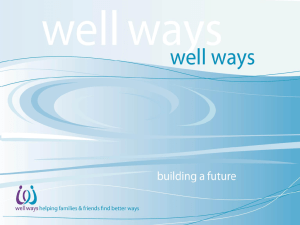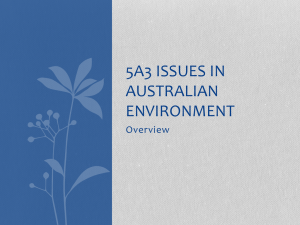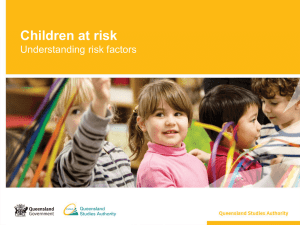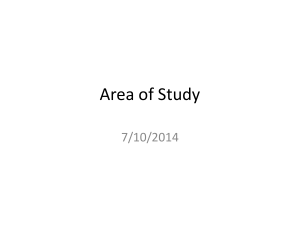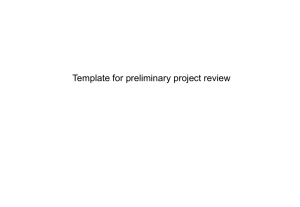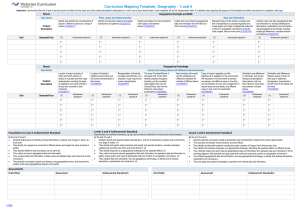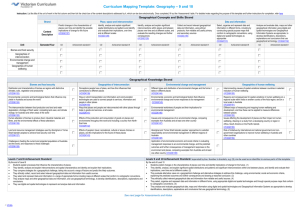Transcript - Family & Relationship Services Australia
advertisement
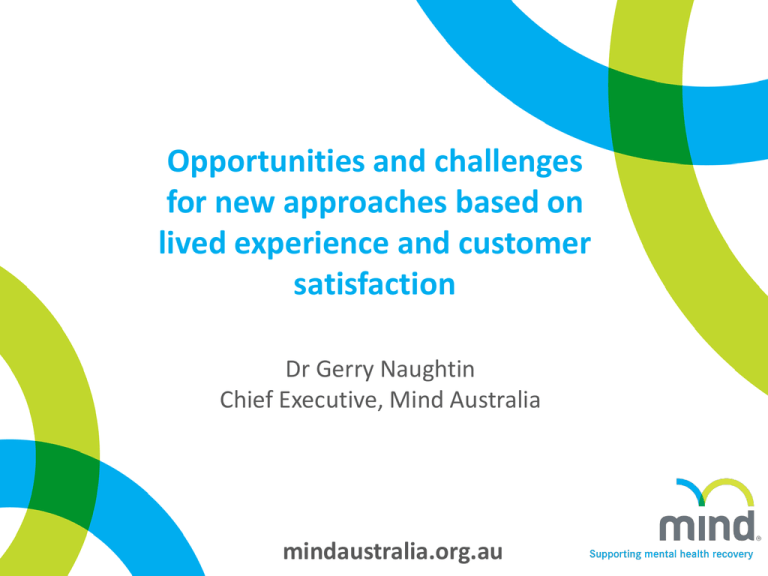
Opportunities and challenges for new approaches based on lived experience and customer satisfaction Dr Gerry Naughtin Chief Executive, Mind Australia mindaustralia.org.au Purpose • Offer some thinking about new ways of funding and doing business in human service organisations • Illustrate this in a practical way by outlining the challenges and opportunities faced by Mind Australia in reframing its business to the emerging market place • Trying to think about responding to human service needs outside of funding silos mindaustralia.org.au Drivers of Change • Growth in demand • Fiscal restraint • Governments and consumers looking for more joined up, effective and cheaper responses • Growing focus on citizen-centric services • Confidence in market mechanisms, across political spectrum, to drive competitive reform and price reduction in human service settings • Increased policy focus on individual choice and control – the personalisation agenda mindaustralia.org.au Characterising the emerging system drivers Driver Current Future Success factors Unique value proposition Commonality with other funded agencies Differentiated Understanding differences and commonalities Service delivery focus Prescribed by funder (outputs) Brand recognition and value for $ Individualised Relationships, brand and costs matter Staff performance Important Important Choice of staff member Service user expectations Not important because of geographical monopolies Critical Understanding and framing expectations mindaustralia.org.au Characterising the emerging system drivers Driver Current Future Success Factors Geographical Coverage Prescribed by funder with geographical coverage of national programs Choice of provider within regions Opening up of service monopolies Capacity to broaden geographical reach at affordable cost Regulation Detailed reporting accountabilities Reduction of red tape Simplify accreditation requirements Government and consumer interest in service competency, popularity and outcomes Performance Outputs and data reporting highly prescribed Focus on outcomes and minimum data requirements Consumer satisfaction and connectivity will be critical mindaustralia.org.au Characterising the emerging system drivers Driver Current Future Success Factors Cost Standardised unit of funding Known $ for defined funding period Funding variable based on demand Government and consumer focus on value for $ Scale, brand recognition and IT systems Cash flow Sector funding Funding to NGO Opening up market to private, statutory and NGO agencies Interest and costs in continuing roles as a service provider mindaustralia.org.au Mind Australia – a case example • Specialist providers of community mental health services in South East Australia • Target Group: people with severe and often long-term mental ill-health and their carers • Over 30 years experience supporting people with mental health issues & their families & carers • Budget 2013\2014 of $60 million with 75% of funding through government block grants • Generate $1.4 M per annum through fund raising • Core service is the delivery of support services for people with psychosocial disabilities and their carers mindaustralia.org.au Mind clients & services • Wide range of services for people with a psychosocial disability across 60 sites: - General information & referral including telephone and webbased - Individual support packages - Groups and day programs - Housing services - Deliver over 400 residential bed-based places every day - Family & carer specific services - Specialist services – including care co-ordination, Prevention Recovery Centres (PARCs) & specialist family therapy services, Partners in Recovery Program mindaustralia.org.au Issues for mental health services in Australia (MH Commission 2012 Report Card) • Limited participation of people with a lived experience in services • An estimated 900,000 people are missing out on services that would help them each year • High proportion of services are provided involuntarily • Poor physical health and early death • Participation in employment is low with only about a third of people in work • Need to strengthen capacity for self management through effective education and learning strategies • Focus on social and economic participation – not just treatment mindaustralia.org.au Mind’s strategic challenge – in a nutshell: • Mind operates a variety of business models prescribed by funders • Move from block funding to personalised packages • 75% of funding for current services will transition to NDIS by July 2018 • NDIS may result in significant $ growth but policy settings uncertain • Many of the current community mental health service models won’t be funded by 2018 mindaustralia.org.au Mind’s strategic challenge • To survive let alone thrive, Mind needs to: – Transform and reposition existing business models, or exit them – Develop new businesses and new business models – Identify and invest in the organisational competencies and foundations that will underpin customer value and business success in the future • While at the same time managing business as usual and usual growth – while it lasts mindaustralia.org.au Mind film clip mindaustralia.org.au The shifting questions for success • What do you think of our services? How can we improve? to • What kind of services or supports would you like us to deliver? mindaustralia.org.au Recognising what we didn’t know • Service models prescribed by state\territory and federal governments • Collection of service models developed over past 20 years • Relevance for future unknown • Consumers in mental health not asked the question – “if you have a choice, where would you like the funding spent?” mindaustralia.org.au Prioritisation of 13 ‘good life’ domains Research undertaken by Mind’s Research Collaboration with Melbourne University “People making choices” (Brophy 2014) 15% 12% 68% 17% Health 20% Economic Social connection 24% Housing 61% 27% Support Person Personal life Self Passions and interests 29% Recreation and leisure 59% 32% 37% Family Empowerment Cultural 34% Living skills Figure 1: Percentage of people who said each goal would be ranked in the top five good life goals mindaustralia.org.au Top 5 Good Life Goals 32% Personal life 68% Health 34% Housing 37% Support person 61% Economic 59% Social connection Figure 2: Top ‘good life’ goals according to participants’ prioritisation of each goal being in their Top 5 mindaustralia.org.au Recovery College: A new service paradigm • Offers an alternative to the ‘expert professional’ model • Co-produced - activities and practices are derived from a knowledge base that brings together ‘lived’ and ‘learned’ expertise • Offers new ‘positions’ for service users, other than the traditional professional-client dyad • Draws on educational theory, combined with lived/learned expertise in mental health • Recovery is supported by the acquisition of skills and knowledge, directed by the learner mindaustralia.org.au Implications for Mind • Resources focus predominantly on employment of staff • Reframing packages of care and ways in which public $ can be used • Implications for workforce flexibility • Need to strengthen focus on barriers to accessing health, housing, social support, employment and education • Focus on people with mental ill-health’s learning and skill development • Strengthening focus on role of carers, family and friends (decision making influencers in understanding and framing service purchase patterns in the future) mindaustralia.org.au Reflections on new ways of doing business • Focus on population-based planning rather than funding stream planning • Packaging services and supports across organisations and sectors – moving beyond “no wrong door” to more integrated service solutions • Providing a differentiated product in a market with increasing pressure for standardisation – the race to the top or the bottom • Understanding the diversity of potential public and private funding sources • Sourcing capital and expertise for business development • Starting to think about our contribution as SMEs in growing corporatised market place: • • Are the business models of today, the business models of the future? Defining our future rather than having it defined for us mindaustralia.org.au


